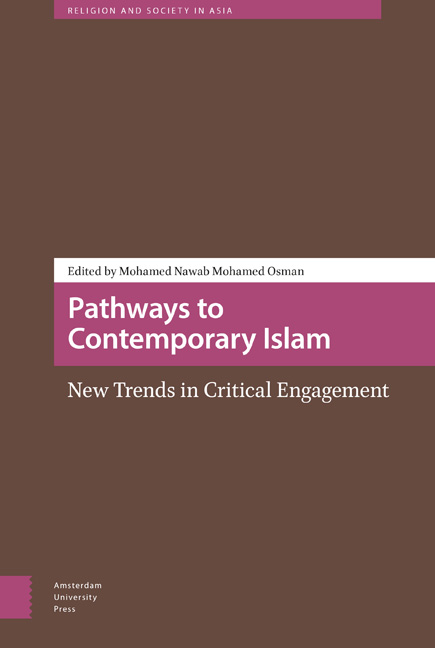Book contents
- Frontmatter
- Dedication
- Contents
- Acknowledgements
- Introduction: Constructing Pathways to Contemporary Islam
- Section 1 Historical Trends in Contemporary Perspective
- Section 2 Contesting the Islamic Intellectual Tradition
- Section 3 Beyond the Arab Revolutions: Political Islam Revised
- Section 4 Contemporary Spaces of Critical Engagement
- Notes on the Contributors
- Index
7 - The Failure of Political Islam Revisited
Published online by Cambridge University Press: 25 November 2020
- Frontmatter
- Dedication
- Contents
- Acknowledgements
- Introduction: Constructing Pathways to Contemporary Islam
- Section 1 Historical Trends in Contemporary Perspective
- Section 2 Contesting the Islamic Intellectual Tradition
- Section 3 Beyond the Arab Revolutions: Political Islam Revised
- Section 4 Contemporary Spaces of Critical Engagement
- Notes on the Contributors
- Index
Summary
Abstract
In this chapter, Olivier Roy re-examines the failure of political Islam in the light of the Arab Spring revolutions. Noting that the notion of political Islam is itself problematic, he stresses that it is politics that defines the space for religion within a state. The chapter argues that Islamists are not doomed to failure, given their success in mobilizing support from the population and winning elections. However, it underlines that Islamists are likely to drop their Islamists objectives in favour of fostering democratic values. The failure of political Islam as such has also resulted in the rise of neo-fundamentalism reflected in Wahhabi-Salafism.
Keywords: Islamism; Salafism; Muslim Brotherhood
When I wrote The Failure of Political Islam in 1992, the title, more than the content (which obviously has not always been read by its commentators), has been the subject of much criticism. These criticisms can be divided into two main categories. The first, coming mainly from non-academic circles, focuses on the prediction reached by the analysis: how can one speak of failure while the Islamists regularly achieved electoral victories (Turkey in 2002, Tunisia in 2011, and Egypt in 2012) and especially while jihadism appears on the rise since September 11, 2001? Isn't the rise of ISIS in the Middle East in 2013 and its continued influence proof that ‘political Islam’ still has a future? The second criticism, more often drawn from the ranks of my academic colleagues, concerns the relevance of the concept of Islamism: would it not be an artificial construction, even tinged with orientalism and postcolonialism, which arbitrarily isolates a political object, constructed according to the categories of Western political science ( political ideology, centrality of the State, insulation of ‘religion’ as a specific category), whereas in the Muslim world, the reference to Islam, fluid and omnipresent, would lie in a continuum in which religion is intrinsically linked to the issue of identity, political legitimacy, and, above all, protest against all forms of neo-imperialism and cultural domination? In short, sometimes I would be too complacent in dealing with the ‘Islamic threat’ and would only be a cog in the endeavour to silence the voice of the oppressed by denying their purely political dimension.
- Type
- Chapter
- Information
- Pathways to Contemporary IslamNew Trends in Critical Engagement, pp. 167 - 180Publisher: Amsterdam University PressPrint publication year: 2020



